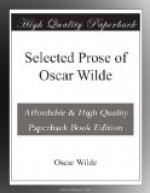Through the dim purple air fly those who have stained
the world with the beauty of their sin, and in the
pit of loathsome disease, dropsy-stricken and swollen
of body into the semblance of a monstrous lute, lies
Adamo di Brescia, the coiner of false coin.
He bids us listen to his misery; we stop, and with
dry and gaping lips he tells us how he dreams day
and night of the brooks of clear water that in cool
dewy channels gush down the green Casentine hills.
Sinon, the false Greek of Troy, mocks at him.
He smites him in the face, and they wrangle.
We are fascinated by their shame, and loiter, till
Virgil chides us and leads us away to that city turreted
by giants where great Nimrod blows his horn.
Terrible things are in store for us, and we go to
meet them in Dante’s raiment and with Dante’s
heart. We traverse the marshes of the Styx, and
Argenti swims to the boat through the slimy waves.
He calls to us, and we reject him. When we
hear the voice of his agony we are glad, and Virgil
praises us for the bitterness of our scorn.
We tread upon the cold crystal of Cocytus, in which
traitors stick like straws in glass. Our foot
strikes against the head of Bocca. He will not
tell us his name, and we tear the hair in handfuls
from the screaming skull. Alberigo prays us to
break the ice upon his face that he may weep a little.
We pledge our word to him, and when he has uttered
his dolorous tale we deny the word that we have spoken,
and pass from him; such cruelty being courtesy indeed,
for who more base than he who has mercy for the condemned
of God? In the jaws of Lucifer we see the man
who sold Christ, and in the jaws of Lucifer the men
who slew Caesar. We tremble, and come forth to
re-behold the stars.—
The Critic as Artist.
THE LIMITATIONS OF GENIUS
The appeal of all Art is simply to the artistic temperament.
Art does not address herself to the specialist.
Her claim is that she is universal, and that in all
her manifestations she is one. Indeed, so far
from its being true that the artist is the best judge
of art, a really great artist can never judge of other
people’s work at all, and can hardly, in fact,
judge of his own. That very concentration of
vision that makes a man an artist, limits by its sheer
intensity his faculty of fine appreciation.
The energy of creation hurries him blindly on to his
own goal. The wheels of his chariot raise the
dust as a cloud around him. The gods are hidden
from each other. They can recognise their worshippers.
That is all . . . Wordsworth saw in Endymion
merely a pretty piece of Paganism, and Shelley, with
his dislike of actuality, was deaf to Wordsworth’s
message, being repelled by its form, and Byron, that
great passionate human incomplete creature, could appreciate
neither the poet of the cloud nor the poet of the
lake, and the wonder of Keats was hidden from him.
The realism of Euripides was hateful to Sophokles.




